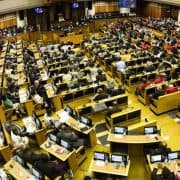|
Getting your Trinity Audio player ready...
|
By Kavisha Pillay, project manager, Bua Mzansi campaign
If staff at the Office of the Public Protector had their way, a high court judge would be their new boss, according to a survey by civil society organisation Corruption Watch.
This is the view of most of the staff working with Public Protector Thuli Madonsela, whose seven-year, non-renewable term ends in October. As a result, Parliament has established an ad hoc committee, chaired by ANC MP Makhosi Khoza, to appoint her replacement.
In her opening speech, Khoza undertook to meet with the secretariat shortly to outline the relevant processes.
She also promised to select “the best person for the job” – and Economic Freedom Fighters (EFF) leader Julius Malema will be there to ensure it happens. He is serving on the committee, together with the DA’s Glynnis Breytenbach, Phumzile van Damme, James Selfe and Werner Horn.
Other members include the ANC’s Bongani Bongo, Amos Masondo, Nicolaas Koornhof, Grace Tseke, Madipoane Mothapo and Patrick Maesela.
Professor Themba Msimang will represent the Inkatha Freedom Party; Steve Swart will stand for the African Christian Democratic Party; and Sibusiso Mncwabe will participate on behalf of the National Freedom Party.
PP staff have their say
With the official process to appoint a new public protector formally under way in Parliament, Madonsela’s staff members were given the opportunity to participate in building the persona of an ideal candidate through a survey.
They were given options for qualifying candidates as stipulated in the Constitution, which states that the public protector must be a South African citizen who is fit and proper to hold office. To be eligible for such a position, the candidate is required to have certain criteria in terms of qualifications and work experience, such as:
- Be a judge of the high court; or
- Be an advocate or an attorney with at least 10 years’ experience after having been admitted; or
- Be an advocate or attorney who lectured law at a university for at least 10 years after having qualified; or
- Have specialised knowledge or experience, over at least 10 years, in the administration of justice, public administration or public finance.
The Constitution also allows the committee to consider appointing an MP with at least 10 years’ experience. However, only 8% of the current staff in Mandonsela’s office supported the idea of a sitting MP as a candidate for the job.
David Lewis, executive director of Corruption Watch, said a similar survey was also sent to MPs to gauge their opinions in building an ideal candidate persona to inform and guide a public nominations process and facilitate dialogue on expectations of the next public protector.
A disappointing 21 of the 418 MPs answered the survey.
The majority of MPs which participated preferred the criteria for the next public protector to include experienced candidates with specialised knowledge in the administration of justice, public administration or public finances. The least favoured candidate was a person with experience as an MP.
While the nation will be preoccupied with the local government elections in August, Khoza’s committee will be meeting during the current parliamentary recess to finalise the process of appointing the new public protector.
Public scrutiny will help guide the appointment process
As the ad hoc committee plans meetings in the following weeks to discuss public participation, Lewis said he was confident that public and legal scrutiny would prevent the appointment of an unsuitable candidate. Corruption Watch would, through its Bua Mzansi campaign, ensure that the public potentially influenced the decision “on who is appointed as the next public protector”.
Bua Mzansi is described by the watchdog as “a nationwide public awareness and participation campaign to highlight and monitor the appointment process and ensure that it is conducted in a transparent manner and is influenced by public opinion”.
At an event hosted recently by the Institute for Security Studies, law professor and constitutional expert Pierre de Vos commented on the importance of preserving the independence of this chapter 9 institution and highlighted the need for the upcoming process to take place in the public spotlight.
According to De Vos, the inclusion of MP experience as a qualifying criteria was only applied to the Public Protector Act in 2003, after Lawrence Mushwana was appointed to the post in 2002. At the time of his appointment, Mushwana was serving as deputy chairperson of the national council of provinces, and his subsequent term as public protector was characterised by soft findings against key members of the ruling party.
Following the Constitutional Court ruling in the recent EFF v Speaker of the National Assembly and Others judgment (otherwise known as the Nkandla ruling), De Vos said that if an MP was appointed as the next public protector, the constitutionality of the criteria could be challenged in court if there was reasonable apprehension of bias.
In his ruling, Chief Justice Mogoeng Mogoeng stated that the Public Protector was established to “strengthen constitutional democracy in the Republic” – and to achieve this crucial objective, the incumbent was required to be “independent and subject only to the Constitution and the law”.
He further said that the Public Protector, like other chapter 9 institutions, was required to be “impartial and to exercise the powers and functions vested in it without fear, favour or prejudice”.
De Vos noted that, given these clear guidelines, including an experienced MP as part of the qualifying criteria for the position of public protector was, in fact, unconstitutional.
• First published in City Press







